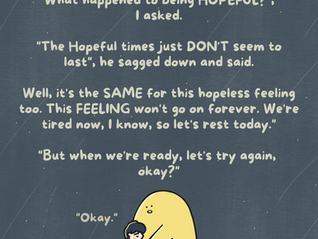PRINTABLE: Daily Gratitude Journal
- Hernping
- Dec 30, 2022
- 2 min read
A research-proven way to boost your daily happiness :)

There’s no right or wrong way to keep a gratitude journal, but here are some tips to get the most out of it!
Each day, write down up to five things for which you feel grateful. The act of writing these down itself is important - don't just do this exercise in your head!
The things you list can be relatively small in importance (“The tasty sandwich I had for lunch today.”) or relatively large (“My sister gave birth to a healthy baby boy.”).
The goal of the exercise is to remember a good event, experience, person, or thing in your life—then enjoy the good emotions that come with it.
Here are a few things you could possibly write about:
Be as specific as possible—specificity is key to fostering gratitude. “I’m grateful that my co-workers brought me soup when I was sick on Tuesday” will be more effective than “I’m grateful for my co-workers.”
Focusing on people to whom you are grateful has more of an impact than focusing on things for which you are grateful.
Savor surprises. Try to record events that were unexpected or surprising, as these tend to elicit stronger levels of gratitude.
Try subtraction, not just addition. Consider what your life would be like without certain people or things, rather than just tallying up all the good stuff. Be grateful for the negative outcomes you avoided, escaped, prevented, or turned into something positive—try not to take that good fortune for granted.
Writing about some of the same people and things is OK, but zero in on a different aspect in detail.
Write regularly. Whether you write daily or every other day, commit to a regular time to journal, then honor that commitment.
Download your handout here :)
Want to know the research?
A group of predominantly white and highly educated people in Brazil increased in positive emotion, happiness, and life satisfaction and decreased in negative emotion and depression after daily gratitude journaling for two weeks.
Polish natives also increased in well-being after gratitude journaling.
Turkish university students improved in college adjustment, life satisfaction, and positive emotion after three weeks of gratitude journaling.
In a New Zealand study, people with arthritis experienced less pain, everyday interferences from their pain, and pain-related anxiety and more self-efficacy after gratitude journaling each week for four weeks.
Muslim undergraduate students in Malaysia increased in happiness after two weeks of writing daily notes of Islamic-based gratitude that expressed “their gratefulness to the Merciful Allah who grants them with blessings and is responsible for their grateful and blessed situations.” About 85% of the participants were women.
A four-week Christianity-based gratitude program, in which pastors led activities such as gratitude journaling, sermons, and psychoeducation, improved well-being, life satisfaction, and interpersonal engagement in members of a mostly white congregation in the American Pacific Northwest.
.jpg)















Comments